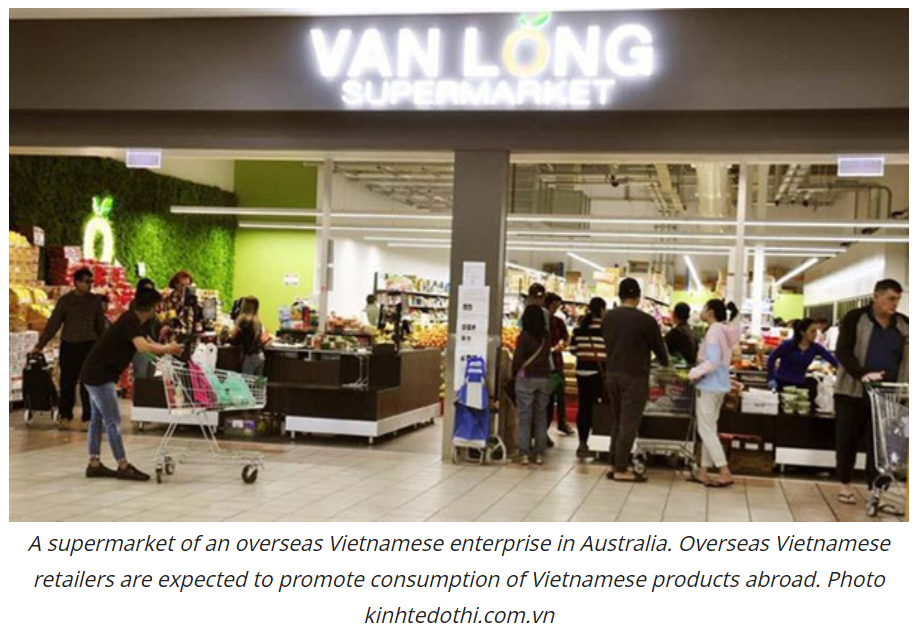Overseas Vietnamese firms are suppliers of Vietnamese goods to foreign markets
The overseas Vietnamese business community is an important distribution channel to bring Vietnamese goods to the world market, said Minister of Industry and Trade Nguyen Hong Dien.
From August 18 to September 27, the MCQ supermarket chain and AusViet Company are implementing a trade promotion programme for Vietnamese rice in Australia with the title “Vietnam, Land of the World’s Best Rice”, according to the Vietnam Trade Office in Australia.
Under this programme, 10,000 bags of rice branded Ban Mai Cung Đình are offered to customers at the MCQ supermarket system that was established by Vietnamese people in 1992 in Perth.
At the same time, the AusViet Company will give hundreds of ST25 rice bags as gifts to Australian consumers in Melbourne to introduce Vietnamese rice to local people.
This is not the first time the overseas Vietnamese business community has introduced Vietnamese agricultural products to the world market. In June 2021, overseas Vietnamese retailers in the EU imported Vietnamese fresh litchi for the first time.
Van Anh, director of Thanh Hung supermarket in Spijkenisse, the Netherlands, said that in previous years, the supermarket has sold Chinese litchi at a price of 22-25 euros per kilo. Therefore, the supermarket has attracted more customers since selling Vietnamese fresh litchi with higher quality at a price of 18 euros per kilo.
President of the Union of Vietnamese Business Associations in Europe Hoang Manh Hue said that Vietnamese people in the EU currently have very good facilities to develop consumption of domestic products. Moreover, overseas Vietnamese enterprises have a certain understanding of European customs and tastes.
So member enterprises of the association are ready to act as sales agents and representatives of Vietnamese goods in Europe, Hue said.
Hoang Dinh Toan, chairman of Tamda Foods Group in the Czech Republic, said the Tamda Foods retail system hopes to continue cooperation with domestic enterprises in bringing Vietnamese products to the European market.
According to experts, Vietnamese goods have a lot of potential in consumption in the European market through overseas Vietnamese enterprises but there are still many challenges in the export process to this market.
Tran Thanh Hai, deputy director of the Import-Export Department under the Ministry of Industry and Trade, said in the export process, Vietnamese goods still face trade barriers in terms of environmental, labour and origin standards. Besides that, Vietnamese goods must comply with strict requirements in quality and design of products in each European country.
Emily Nguyen, the representative of a US import-export firm, said that Vietnam is the largest dragon fruit producer in the world, but only about 5 per cent of local dragon fruit output enters the US market because each State in the US has regulations on quality, design and origins, so many Vietnamese products cannot meet all of these standards.
Hoang Xuan Binh, chairman of the Vietnam Business Association in Poland, said that Vietnamese goods have not improved design, so they have not attracted local people.
Binh was quoted by the Kinh tế & Đô thị (Economics & Urban Affairs) newspaper as saying that “Vietnamese enterprises must improve product designs according to the demand of EU countries. Trade centres of the Vietnamese community in the EU also need to support Vietnamese export enterprises in consumption of Vietnamese products in this market.”
According to Hue, in order to bring Vietnamese goods to other countries, it is necessary to establish a commodity information channel between associations of overseas Vietnamese in Europe and Vietnamese trade offices in the European countries. That will improve efficiency in cooperation between them to promote consumption of local products in Europe.
One more challenge is that many small and medium sized enterprises of Vietnam have lacked funding for marketing their products.
Therefore, Binh said Vietnamese enterprises should promote links with overseas Vietnamese enterprises in marketing Vietnamese products, thereby reducing costs and increasing opportunities in entering the European market.
In order to support consumption of Vietnamese goods abroad, the Hanoi People’s Committee has been implementing a project encouraging Vietnamese people overseas to participate in marketing and consuming local products and developing distribution channels of Vietnamese goods abroad.
Deputy Director of the Hanoi Department of Industry and Trade Nguyen Thanh Hai said that the department will coordinate with the overseas Vietnamese business community to carry out trade promotion activities for Vietnamese goods in key markets such as the US, Russia, Eastern Europe, Japan and South Korea.
Source: Vietnam News


 Thailand
Thailand




